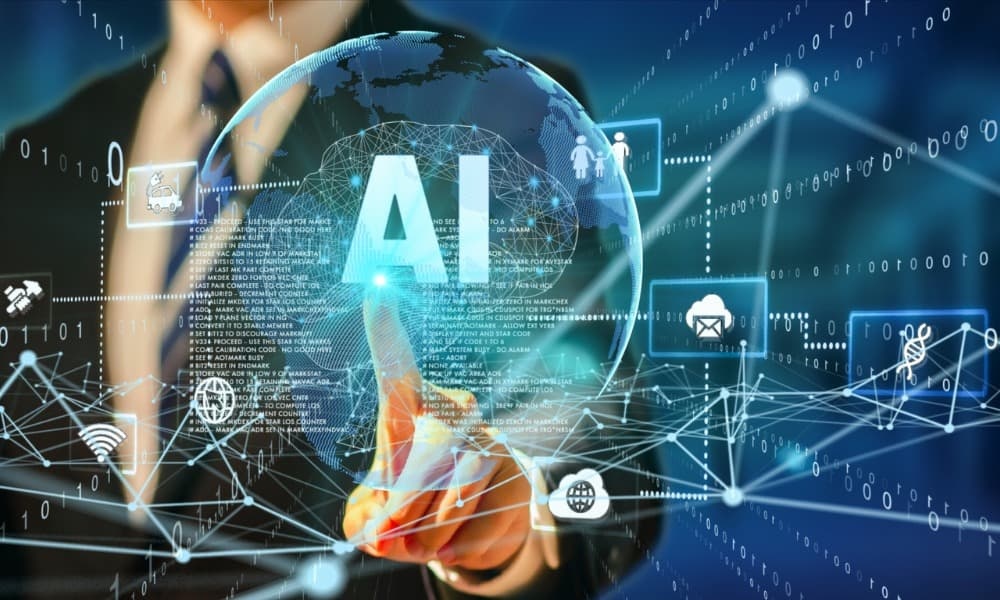
Artificial intelligence offers tremendous value to the business industry. It’s expected to make businesses 40% more efficient by 2035, too, which is worth an estimated $14 trillion in economic value. Companies are quickly implementing AI for a range of applications, but its rapid adoption is quickly surpassing the current ability to use this technology responsibly and ethically.
Governments, businesses, and consumers are all calling for AI to be deployed as ethically as possible, but making laws and developing ethical frameworks around this emerging and constantly changing technology is proving to be difficult. This guide explains the most prominent ethical AI concerns related to business applications and examines the future of ethical AI in the workplace. It also details what organizations must do to be as ethical as possible as they rely more and more heavily on this technology.
AI refers to a machine or computer’s ability to emulate intelligent human behavior. AI systems can solve problems and assess risks. They can also make predictions or take actions based on what they have learned from their environment.
AI isn’t the future. It’s the present, and it’s already used in all kinds of business applications, including human resources, payroll, marketing, customer service, fraud detection, and administrative tasks.
AI can automate repetitive tasks for humans, such as transferring data between different programs. It can also improve human processes, such as scanning bank checks to look for minute signs of fraud that can’t be detected with the human eye. AI can even use machine learning to spot aberrations in account holder activity that may indicate fraud.
This groundbreaking technology promises to bring countless benefits to businesses, but it also comes with many ethical concerns, including the following:
AI can never be fully unbiased, because any AI software will reflect the biases of its designers. Businesses and governments need to develop standards to measure ethical AI bias, assess fairness in different contexts, and create acceptable threshold limits for bias.
The inherent algorithmic bias in AI is due to a lack of diversity in AI development. Development teams need to include more women and people of color to become less biased and create more ethical AI systems.
Many companies use AI to track consumer and employee behavior, but this technology needs to be implemented in a way that respects privacy concerns. Employees and consumers should be able to see how and why companies are using their data, and they should have the ability to opt out of invasive AI applications.
There are minimal formal standards for the use of AI, and proposed federal and state legislation has gained little traction of late. Companies need to create ethical frameworks that reflect their own values and visions. They also need to be proactive about educating the government about the importance of the ethical development and deployment of AI.
AI is faster, more efficient, and less likely to make errors than humans. It can also work 24/7/365 without breaks, but this doesn’t mean employers should rush to replace humans with machines. Employers should instead use AI to complement their human employees — for instance, they should use AI to do repetitive tasks so their employees can focus on meaningful work.
AI is ushering in changes similar to and as dramatic as the changes created by the Industrial Revolution. This technology promises to make businesses more innovative, efficient, and productive, but it’s important to keep ethics at the front of the conversation. AI should not damage people in the pursuit of improving a business’s bottom line.
.jpg?width=900&name=Untitled%20design%20(20).jpg)
Businesses must develop ethical approaches to AI on their own terms in the absence of legal regulations. The ethical implications of AI are impossible to measure at this point, though, so organizations will likely end up focusing on operationalizing ethics rather than on developing ethical principles. The following ideals are likely to take center stage as AI becomes more pervasive in the workplace.
Businesses committed to ethical AI will make sure they are sourcing and managing data in a responsible way. They will reduce algorithmic bias as much as possible while realizing that it’s impossible to eliminate bias.
Businesses will be more transparent about their use of AI to all their stakeholders. They will explain why their algorithms make certain predictions to both users and regulators of their AI systems.
AI systems collect and use thousands or even millions of data points, and much of this data is sensitive or private. Businesses will need to ensure this information is as safe as possible to protect themselves, their clients, and their employees.
Businesses will become more accountable in how they’re using AI, and again, transparency will play a significant role. They will be open about what they are doing, and they will be accountable when mistakes happen.
All these issues will continue to evolve as businesses use more AI. Governments are also expected to develop legal frameworks, and as legal changes are implemented, companies will adjust their use of AI to comply.
AI has the potential to revolutionize payroll, human resources, and many other aspects of your business, but these tools aren’t always easy to use. Organizations need to learn how to optimize AI-based tools to improve their internal processes, but they also need to think about what ethical AI use means.
Ignite HCM can answer your questions and guide your business toward the most efficient and ethical implementation of AI tools related to payroll and human resources. We offer innovative payroll management services, including on-demand ADP consulting and support. Contact our team today for help with managing payroll and optimizing your approach to HR.


